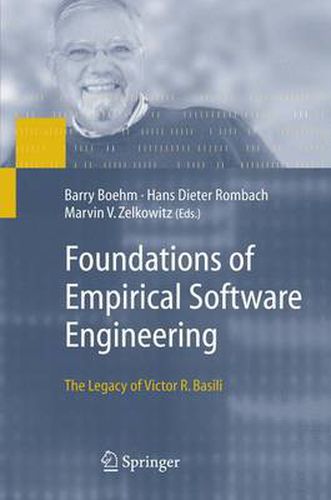Readings Newsletter
Become a Readings Member to make your shopping experience even easier.
Sign in or sign up for free!
You’re not far away from qualifying for FREE standard shipping within Australia
You’ve qualified for FREE standard shipping within Australia
The cart is loading…






This title is printed to order. This book may have been self-published. If so, we cannot guarantee the quality of the content. In the main most books will have gone through the editing process however some may not. We therefore suggest that you be aware of this before ordering this book. If in doubt check either the author or publisher’s details as we are unable to accept any returns unless they are faulty. Please contact us if you have any questions.
Although software engineering can trace its beginnings to a NATO conf- ence in 1968, it cannot be said to have become an empirical science until the 1970s with the advent of the work of Prof. Victor Robert Basili of the University of Maryland. In addition to the need to engineer software was the need to understand software. Much like other sciences, such as physics, chemistry, and biology, software engineering needed a discipline of obs- vation, theory formation, experimentation, and feedback. By applying the scientific method to the software engineering domain, Basili developed concepts like the Goal-Question-Metric method, the Quality-Improvement- Paradigm, and the Experience Factory to help bring a sense of order to the ad hoc developments so prevalent in the software engineering field. On the occasion of Basili’s 65th birthday, we present this book c- taining reprints of 20 papers that defined much of his work. We divided the 20 papers into 6 sections, each describing a different facet of his work, and asked several individuals to write an introduction to each section. Instead of describing the scope of this book in this preface, we decided to let one of his papers, the keynote paper he gave at the International C- ference on Software Engineering in 1996 in Berlin, Germany to lead off this book. He, better than we, can best describe his views on what is - perimental software engineering.
$9.00 standard shipping within Australia
FREE standard shipping within Australia for orders over $100.00
Express & International shipping calculated at checkout
This title is printed to order. This book may have been self-published. If so, we cannot guarantee the quality of the content. In the main most books will have gone through the editing process however some may not. We therefore suggest that you be aware of this before ordering this book. If in doubt check either the author or publisher’s details as we are unable to accept any returns unless they are faulty. Please contact us if you have any questions.
Although software engineering can trace its beginnings to a NATO conf- ence in 1968, it cannot be said to have become an empirical science until the 1970s with the advent of the work of Prof. Victor Robert Basili of the University of Maryland. In addition to the need to engineer software was the need to understand software. Much like other sciences, such as physics, chemistry, and biology, software engineering needed a discipline of obs- vation, theory formation, experimentation, and feedback. By applying the scientific method to the software engineering domain, Basili developed concepts like the Goal-Question-Metric method, the Quality-Improvement- Paradigm, and the Experience Factory to help bring a sense of order to the ad hoc developments so prevalent in the software engineering field. On the occasion of Basili’s 65th birthday, we present this book c- taining reprints of 20 papers that defined much of his work. We divided the 20 papers into 6 sections, each describing a different facet of his work, and asked several individuals to write an introduction to each section. Instead of describing the scope of this book in this preface, we decided to let one of his papers, the keynote paper he gave at the International C- ference on Software Engineering in 1996 in Berlin, Germany to lead off this book. He, better than we, can best describe his views on what is - perimental software engineering.